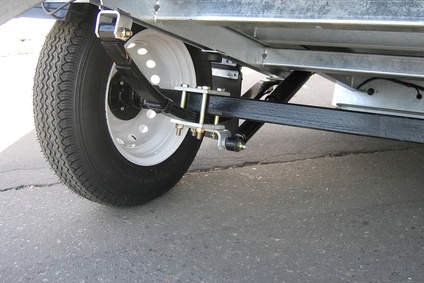
When hauling a load behind a truck or rig, a trailer tire blowout can cause cargo damage and be just as dangerous on the road as a vehicle tire blowout. Many factors play a role in how a trailer's tires will function and how a tire blowout can actually occur on the road: improper maintenance, roadside hazards and even the extremes of weather can all cause trailer tire blowouts.
A hole in the tire tread or wall can cause pressure to build up around the crevice and, when that pressure becomes too great for the remaining strength of the rubber, cause a tire blowout. Nails, screws, glass, dry-rot cracking and even feathering from uneven wear and tear can cause small openings in the tire or tire wall and present a dangerous threat of explosion or flattening. Once the puncture loses the battle with tire pressure, the tire can pop or shred and cause hazardous driving conditions. Check trailer tires for punctures or cracking at every refueling or rest stop to avoid a dangerous blowout.
Under-inflating a trailer tire puts undue stress on the wall of the tire and can contribute to blowout conditions. When a tire is under-filled and the psi is low, highway speeds and temperatures can cause excessive heat to build up in the tire and bend the connection between the tire wall and its tread. If this flexing continues under high speeds or rising outside temperature, the tire can separate and cause a blowout. Checking tire psi on a regular basis can avoid under and over-inflation issues and minimize the potential of a blowout. The recommended psi for a trailer tire is usually printed on the wall of the tire.
The rubber from which trailer tires are manufactured is not immune to the shrinking and swelling that outdoor temperature extremes can cause in exposed materials. Changing temperatures can cause cracking or flexing in the walls and tread of tires that can contribute to puncture and cracking blowouts. Fluctuations in temperature actually change the psi inside of a tire, leading to instances of over or under-inflation that can also contribute to blowouts in a trailer tire. Monitor temperatures carefully when hauling in extreme weather changes and visually inspect tires in these conditions during rest and refuelling stops.
Trailers are limited by their capacity rating as to how much they can safely and effectively haul. Trailer tires are subject to these same limitations and are usually rated at the same level or higher carrying capacity than the trailer they are attached to. However, overloading a trailer, while potentially damaging to your vehicle, trailer and cargo, can also put undue stress on the tires, causing the pressures within to rise, the walls to flex outward and pressure to build around any small punctures or leaks on the tire. Overloading a trailer intensifies the risk of blowout from any other blowout cause and can force the tire to rub or grate into the trailer itself. Avoid the danger of overloaded trailer tires by closely monitoring the size of your load.